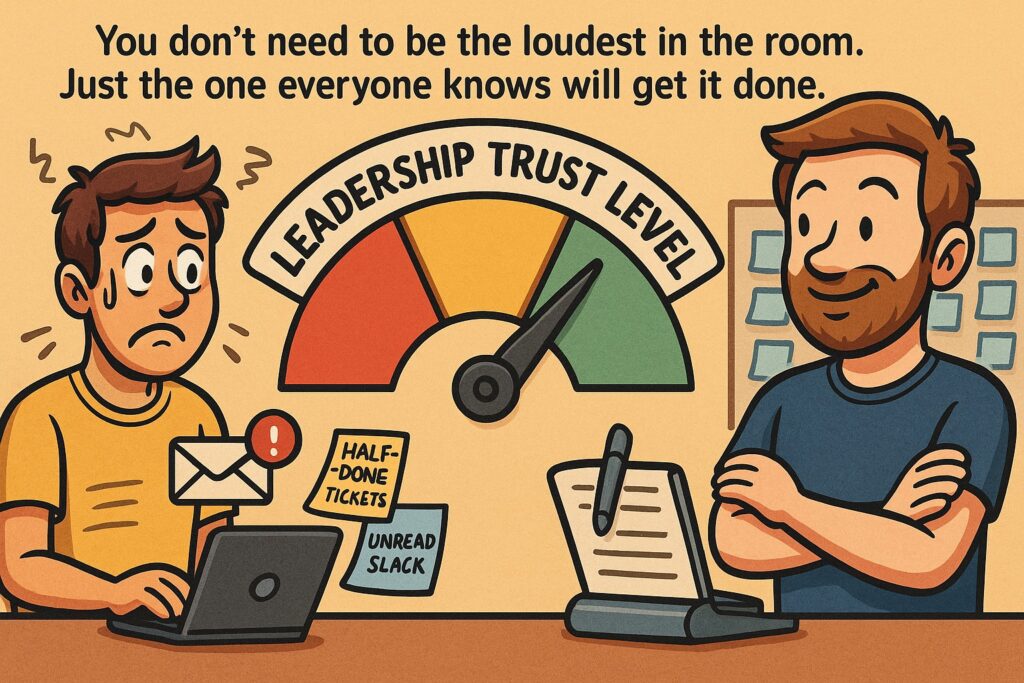If there’s one trait that defines strong engineering leadership—whether you’re a team lead, EM, or CTO—it’s this:

Follow-through
You could call it consistency, dependability, ownership or trust. But at its core, it means this: When you say you’ll do something, people can count on it getting done. Period.
That doesn’t just mean writing code or shipping features. It means that when a decision is made, or you raise your hand in a meeting, the people around you know you’ll handle it. You’ll loop in the right people. You’ll raise the questions that need raising. You’ll document what needs documenting. You’ll follow up if needed. But most importantly—you’ll own it.
The Leadership Trust Gap
This came up in a recent conversation I had with a COO. She shared something simple but powerful:
There are leaders she can ask something of and then completely let go, confident it’ll happen.
And then there are others—just as smart, just as experienced—who require babysitting. She has to track their delegation, chase down updates, and follow up repeatedly. That costs her time and energy.
Being a good leader isn’t just about insight or intellect. It’s about dependability.
What Great Follow-Through Looks Like
One of the best compliments I ever received from a manager was this:
“When I give you a project, I know I don’t have to worry about it. You’ll get the right people involved, handle the unknowns, and deliver without needing to be micromanaged.”
That’s what real trust looks like. It’s not about volume—it’s about signal. When you commit to something, it means something.
Your coworkers and execs remember that.
The Buffett Principle
I once read a story about Warren Buffett (no idea if it’s 100% true, but it stuck with me).
When he hires a CEO, he looks for someone he trusts so deeply that the relationship looks like this:
“Come back in a year and tell me how much money you made.”
That’s it. No endless check-ins. No hovering. Just trust and results.
When Trust Is Lost
Losing trust doesn’t usually happen in a dramatic moment—it’s a slow erosion. A missed deadline here. A lack of follow-up there. A promise made in a meeting that never materializes. People start double-checking your work, looping in others “just in case,” or quietly assigning key tasks elsewhere.
And once that pattern sets in, it’s hard to break. You go from being the go-to person to someone people work around. Not because you’re not smart or capable—but because reliability is what makes leadership sustainable.
The good news? Trust can be rebuilt. But it takes consistency, over time, to flip that reputation back around.
Why This Trait Changes Your Career
Leadership isn’t about doing everything yourself—it’s a team sport. Most decisions come from a mix of voices: leadership, peers, stakeholders, your own team. You’ll rarely be expected to have all the answers on your own.
But what is entirely on you is how consistently you take ownership of the problems you’re given. You might need to gather context, pull in the right collaborators, or make a call with imperfect data. That’s normal. What matters is that people trust you to move it forward—every time.
If your manager can delegate something and fully let go…
If your peers know they don’t need to follow up twice…
You instantly become the kind of leader people want to work with again and again. Because you make their lives easier. You’re dependable. And that’s rare.
💡Liked this post?
Get real-world solutions like this in your inbox—join the newsletter.